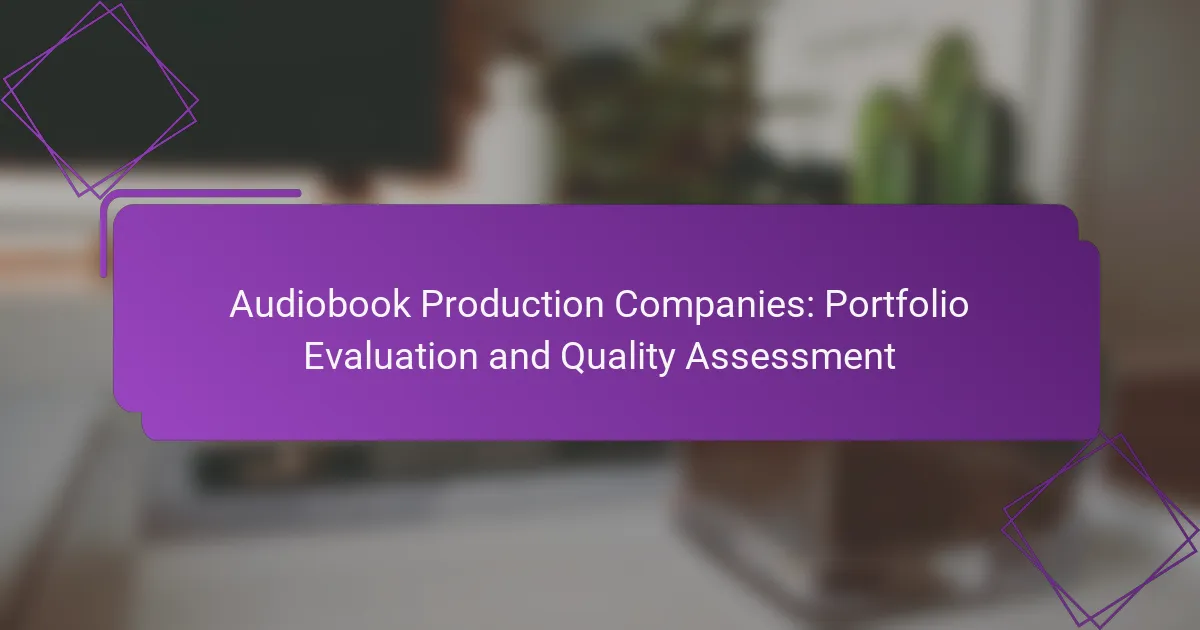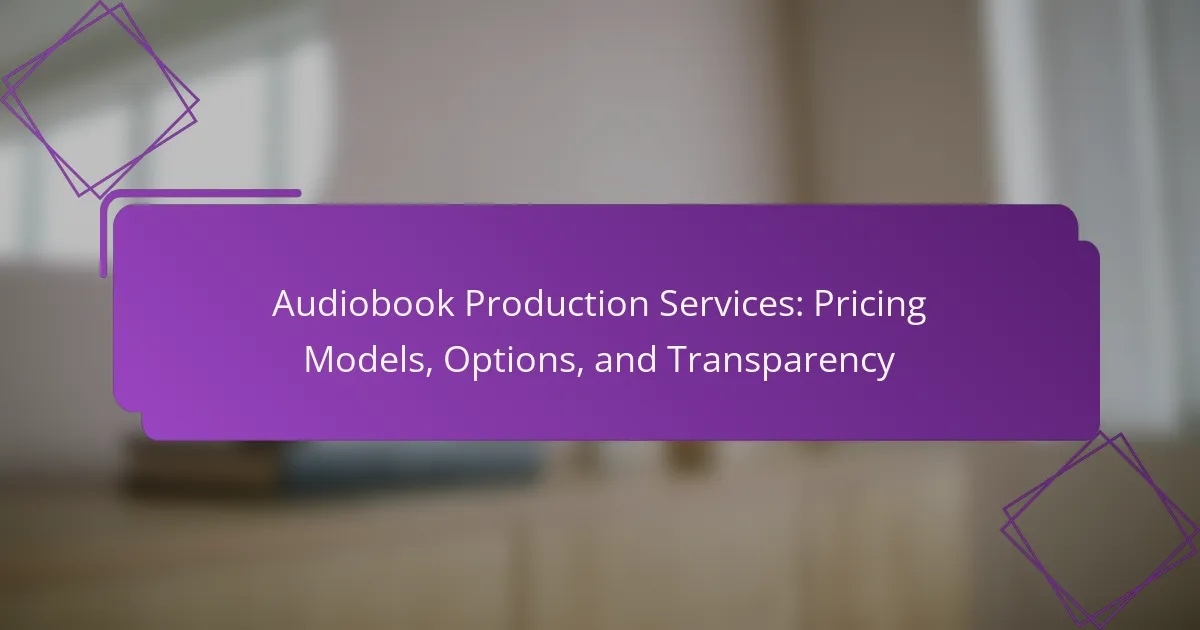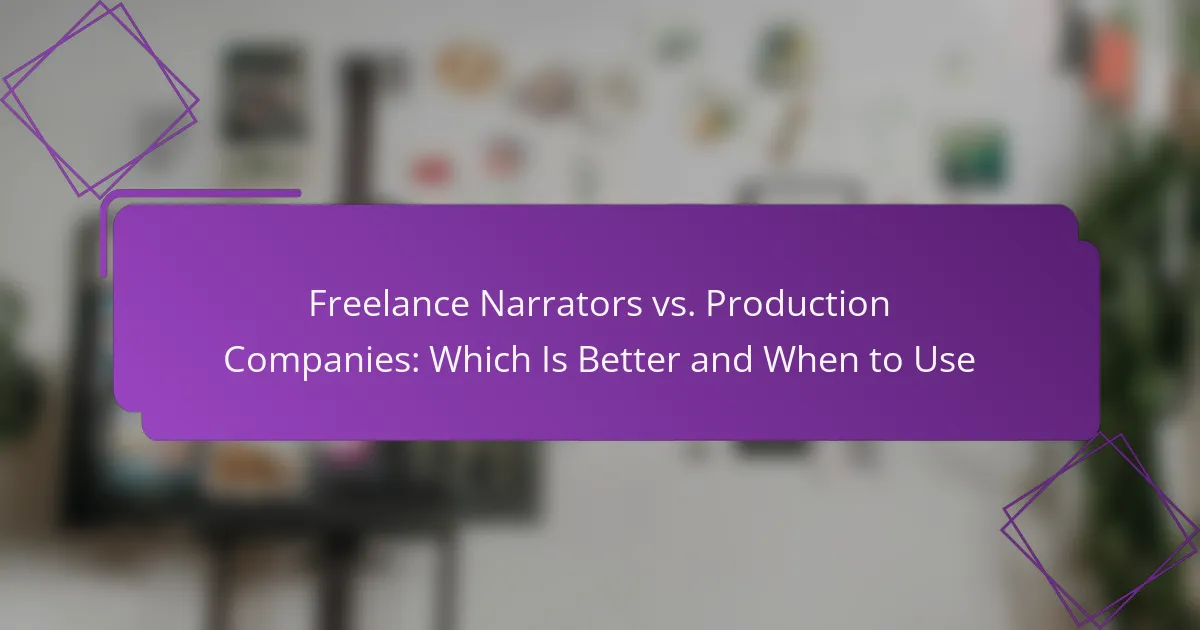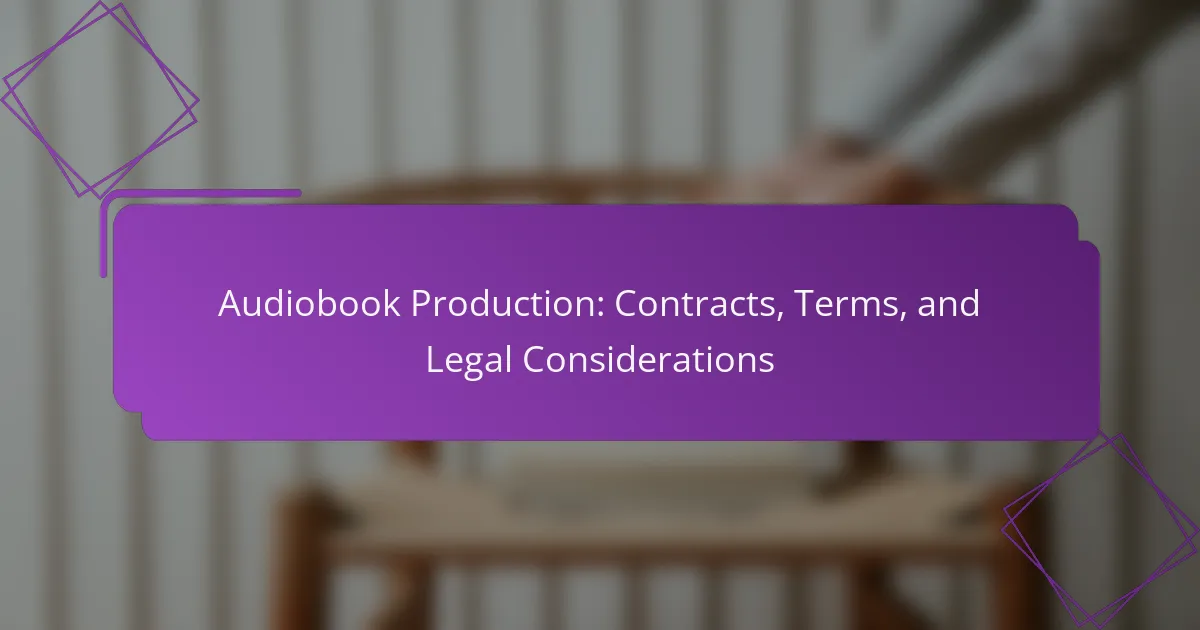Audiobook production companies play a crucial role in delivering high-quality audio content to listeners. By evaluating their portfolios, including audio quality, genre diversity, and client feedback, one can gain valuable insights into their capabilities. Quality assessment focuses on critical elements such as narration style and sound editing, which significantly impact the overall listening experience.

Which audiobook production companies are top-rated in the US?
Top-rated audiobook production companies in the US are known for their high-quality audio, diverse catalog, and professional production standards. Companies like Audible Studios, Blackstone Publishing, Findaway Voices, Penguin Random House Audio, and Recorded Books consistently deliver exceptional content that appeals to a wide audience.
Audible Studios
Audible Studios is a leading name in audiobook production, primarily known for its extensive library and exclusive content. They focus on high-quality recordings and often collaborate with well-known authors and narrators to enhance the listening experience.
When considering Audible Studios, look for their original titles and popular series. Their subscription model allows users to access a vast range of audiobooks, making it a cost-effective option for avid listeners.
Blackstone Publishing
Blackstone Publishing is recognized for its diverse catalog that includes both fiction and non-fiction titles. They pride themselves on high production values and often feature award-winning narrators, which adds to the overall quality of their audiobooks.
For those evaluating Blackstone, consider their focus on independent authors and unique titles that may not be available elsewhere. Their commitment to quality makes them a strong contender in the audiobook market.
Findaway Voices
Findaway Voices specializes in providing tools for authors and publishers to create and distribute audiobooks. They offer a user-friendly platform that allows creators to maintain control over their content while reaching a broad audience through various retailers.
When using Findaway Voices, authors should consider the distribution options available, as they can reach listeners on platforms like Audible, Apple Books, and more. This flexibility can significantly enhance an author’s reach and potential earnings.
Penguin Random House Audio
Penguin Random House Audio is part of one of the largest publishing houses in the world, offering a wide range of bestsellers and classic titles. Their production quality is consistently high, and they often feature renowned narrators.
For listeners, Penguin Random House Audio is a reliable source for popular titles, making it a go-to choice for those looking for well-produced audiobooks. Their marketing and distribution capabilities also ensure that new releases are widely available.
Recorded Books
Recorded Books is known for its extensive library that caters to both public libraries and individual consumers. They focus on providing a wide array of genres, including educational and professional titles, which makes them a unique player in the audiobook market.
When considering Recorded Books, evaluate their subscription services for libraries, as well as their offerings for individual listeners. Their commitment to quality and variety can meet diverse listening needs, from leisure to professional development.
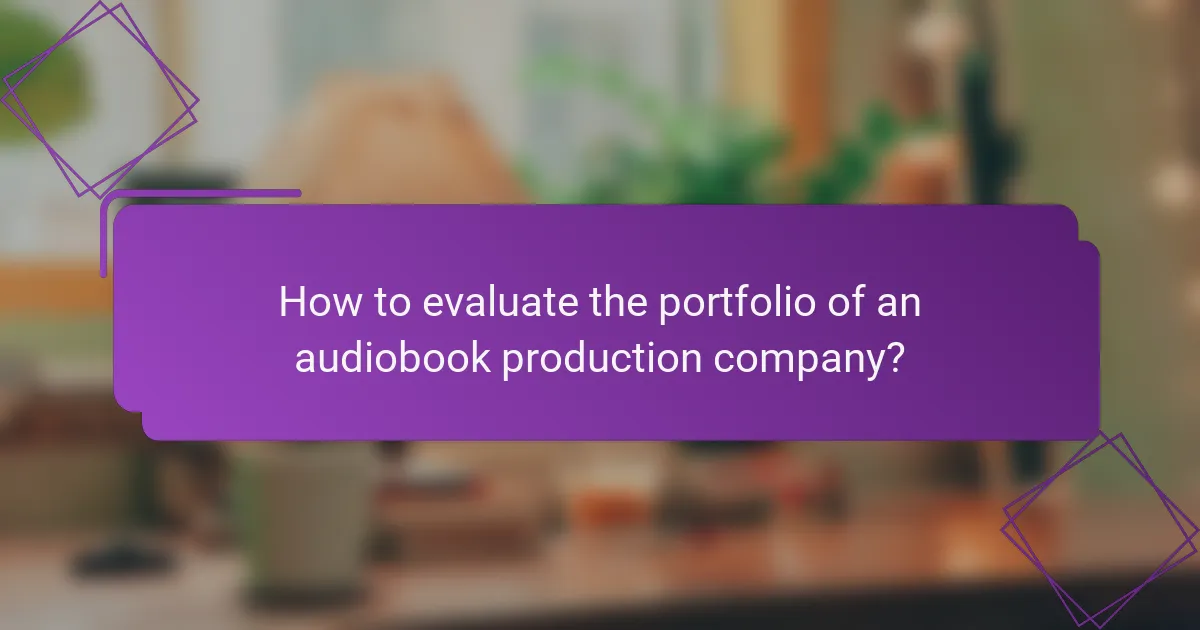
How to evaluate the portfolio of an audiobook production company?
Evaluating the portfolio of an audiobook production company involves examining their audio quality, genre diversity, and client feedback. These factors provide insight into the company’s capabilities and reliability in delivering high-quality audiobooks.
Assess audio quality and production standards
Audio quality is crucial in audiobook production, as it directly affects listener engagement. Look for companies that adhere to industry standards, such as those set by the Audio Publishers Association, which recommend specific bit rates and sample rates for clarity.
Listen to samples from their portfolio to gauge sound clarity, background noise, and overall production quality. A well-produced audiobook should have balanced audio levels, clear narration, and minimal distractions.
Review variety of genres and titles
A diverse portfolio showcases a production company’s versatility and expertise across different genres. Check if they have experience with various formats, such as fiction, non-fiction, educational, and children’s audiobooks.
Consider the number of titles they have produced in each genre. A company with a broad selection is likely to understand the nuances of different audiences and storytelling styles, which can enhance the final product.
Check client testimonials and case studies
Client testimonials provide valuable insights into a company’s reliability and quality of service. Look for feedback on platforms like their website or third-party review sites to see what previous clients have to say about their experiences.
Case studies can also highlight successful projects and the specific challenges the company overcame. Pay attention to details such as turnaround times, communication, and how well they met client expectations, as these factors are critical for a successful partnership.
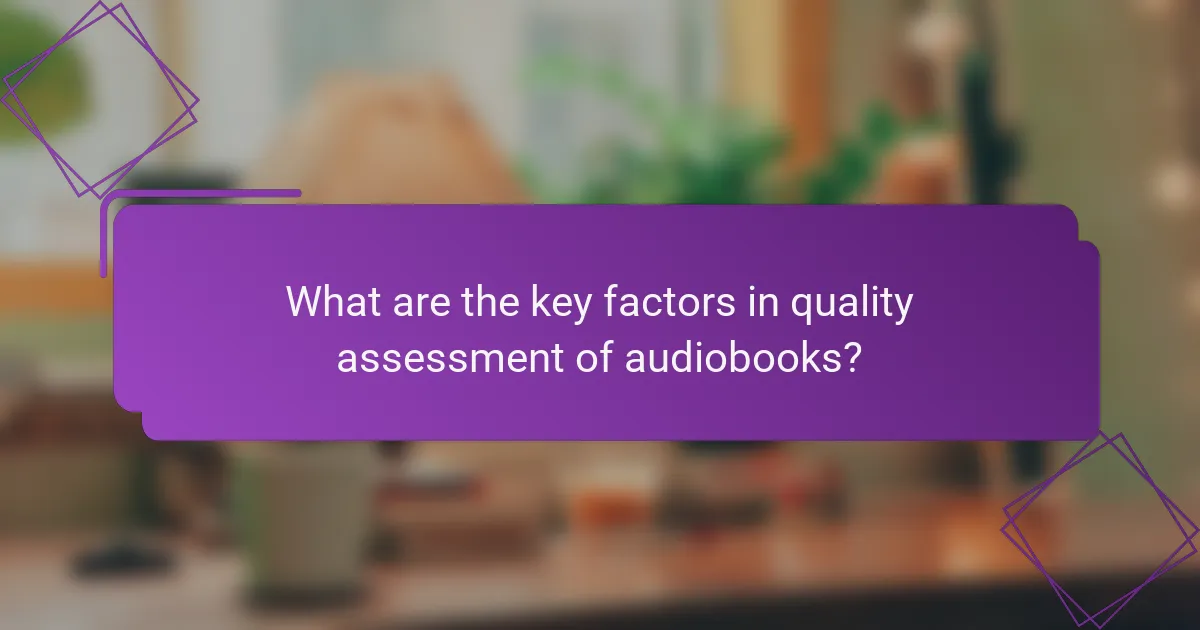
What are the key factors in quality assessment of audiobooks?
The quality assessment of audiobooks hinges on several critical factors that determine the overall listening experience. Key elements include narration style, sound editing, and adherence to industry standards, all of which contribute to the audiobook’s professionalism and appeal.
Narration style and voice talent
Narration style and the choice of voice talent are pivotal in engaging listeners. A skilled narrator should possess a clear and expressive voice, with the ability to convey emotion and character nuances effectively. Selecting the right voice talent can significantly enhance the storytelling experience, making it more immersive.
When evaluating narration, consider the genre of the audiobook. For instance, a dramatic fiction piece may benefit from a more theatrical style, while a non-fiction title might require a straightforward, authoritative tone. Listening to samples can help determine the best fit for your project.
Sound editing and mixing quality
Sound editing and mixing quality are essential for producing a polished audiobook. This includes removing background noise, ensuring consistent volume levels, and balancing sound effects or music with narration. High-quality sound editing can prevent listener fatigue and enhance clarity.
Common pitfalls in sound editing include inconsistent audio levels and distracting background sounds. Aim for a final product where the narration is clear and free from interruptions, typically achieving a dynamic range that suits the content—generally between -3 dB and -6 dB for peak levels.
Adherence to industry standards
Adherence to industry standards is crucial for ensuring that audiobooks meet listener expectations and are compatible with various platforms. The Audiobook Publishers Association (APA) provides guidelines on audio quality, file formats, and metadata that should be followed during production.
For example, audiobooks should typically be delivered in MP3 format with a sample rate of 44.1 kHz and a bit rate of at least 192 kbps. Ensuring compliance with these standards not only improves the listening experience but also facilitates distribution across major platforms like Audible and iTunes.

How do pricing models vary among audiobook production companies?
Pricing models among audiobook production companies can differ significantly, affecting both authors and publishers. Understanding these models is crucial for making informed decisions about production costs and potential returns on investment.
Per finished hour pricing
Per finished hour pricing is a common model where the cost is calculated based on the total length of the completed audiobook. Rates typically range from around $200 to $500 per finished hour, depending on the experience of the narrator and the complexity of the project.
When considering this model, it’s essential to factor in the expected length of your audiobook and the quality of narration. Higher rates may correlate with more experienced narrators, which can enhance the final product’s appeal.
Royalty share agreements
Royalty share agreements involve splitting the revenue generated from audiobook sales between the production company and the author. This model is often attractive for authors with limited upfront budgets, as it minimizes initial costs.
However, it’s important to negotiate clear terms regarding the percentage split and the duration of the agreement. Authors should also consider the potential long-term earnings versus the upfront investment of other pricing models.
Flat fee structures
Flat fee structures provide a fixed price for the entire audiobook production, regardless of its length. This model can offer predictability in budgeting, with costs typically ranging from a few thousand to tens of thousands of dollars, depending on the project’s scope.
While flat fees can simplify financial planning, authors should ensure that the production quality meets their expectations. It’s advisable to review samples of previous work from the production company to gauge their capabilities before committing to a flat fee agreement.
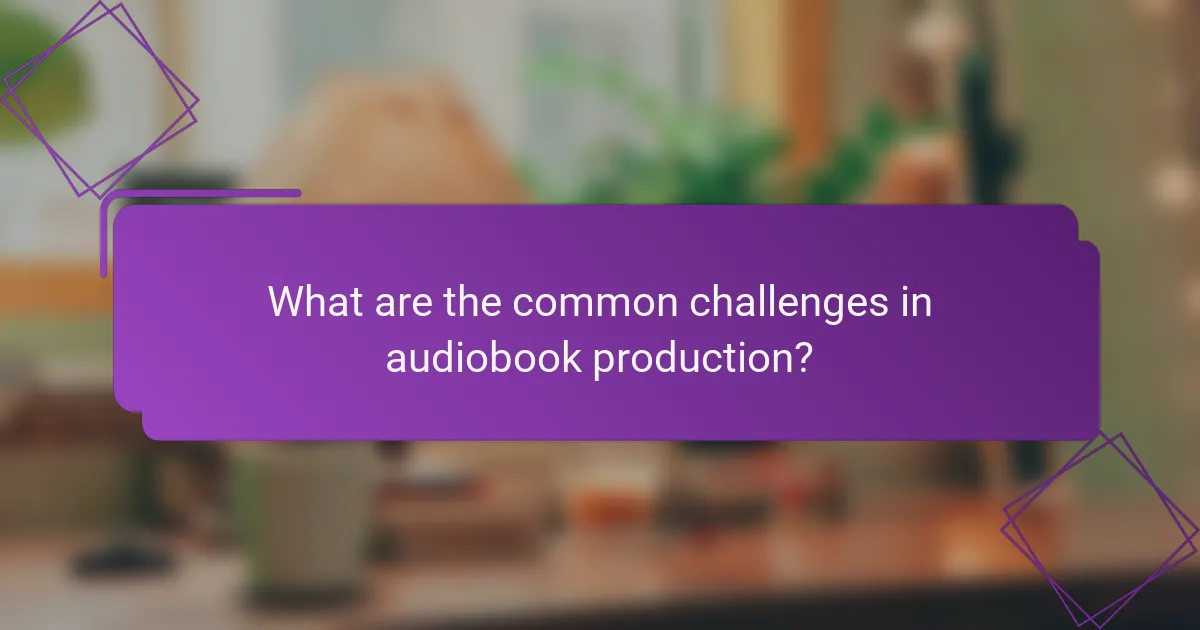
What are the common challenges in audiobook production?
Audiobook production often faces challenges such as selecting the right narrator and adhering to production timelines. These factors significantly impact the final quality and marketability of the audiobook.
Finding the right narrator
Selecting the appropriate narrator is crucial for conveying the tone and emotion of the text. A good narrator should not only have a pleasant voice but also the ability to interpret the material effectively, which can vary widely depending on the genre.
Consider factors such as the narrator’s experience, vocal range, and familiarity with the subject matter. For instance, a romance novel may benefit from a narrator with a warm, engaging voice, while a thriller might require someone who can convey tension and urgency.
Managing production timelines
Production timelines can be challenging due to the various stages involved, including script preparation, recording, editing, and mastering. Each phase requires careful planning to ensure the project stays on track and meets deadlines.
To manage timelines effectively, establish a clear schedule with milestones for each stage. Communicate regularly with all team members to address potential delays early. It’s advisable to build in buffer time to accommodate unforeseen issues, such as technical difficulties or narrator availability.
